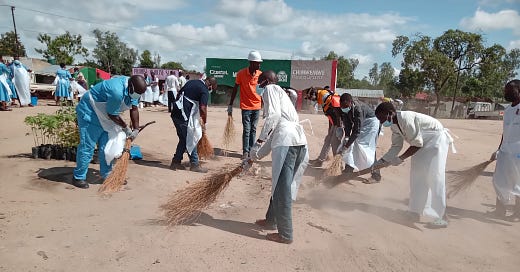Neno Citizens Urged to Embrace Hygiene
Neno is one of the districts which was hit hard by cholera pandemic as it registered 784 cases cumulatively with 10 deaths with Zalewa, Midzemba, Luwani and Lisungwi as the most affected areas.
NENO, Malawi - Traditional Authority Symon of Neno has urged people in the district to embrace the clean-up exercise in order contain cholera and water borne diseases, writes Salome Gangire, MANA.
"I participated in the clean –up exercise to lead as an example so that people should also emulate the gesture and replicate it in their homes, workplace and their surroundings," Symon said Friday at Zalewa market during the clean-up exercise organised by Neno District Council.
He said having a clean environment in places like markets is crucial as most people patronise such places which if left unattended could spread a number of water borne diseases.
Neno District Council Director of Planning and Development, Charles Lomoni said the exercise was conducted following president Lazarus Chakwera's launch of the national clean-up campaign in 2020 to enhance sanitation and hygiene among Malawians and Tithetse Cholera campaign which was launched in February 2024 aimed at promoting good hygiene practices in a bid to end cholera.
He said the council has been conducting the clean-up exercises in various places to make sure that the district is clean and to inculcate the culture in citizens so that they embrace the campaign.
“The initiative is aimed at making sure that the district is clean hence the inclusion of various stakeholders such as chiefs, business community, citizens and council officials,” Lomoni said.
Chairperson for Zalewa Market Mike Zamadunga asked the council to provide them with bins and pit latrines as the absence of the two compromise hygiene at the markets.
Similar clean-up exercises were conducted at Kambale and Ligowe markets.
Neno is one of the districts which was hit hard by cholera pandemic as it registered 784 cases cumulatively with 10 deaths with Zalewa, Midzemba, Luwani and Lisungwi as the most affected areas.



